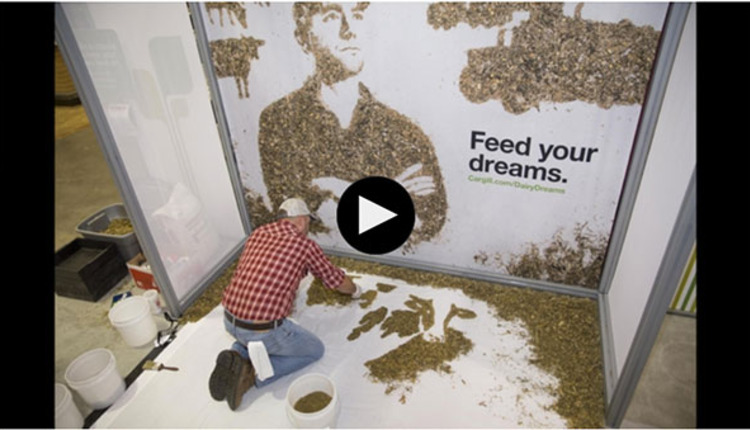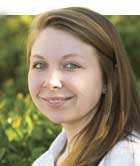
At its finest, nutrition is a combination of both science and art. Cargill is capitalizing on both as it enlists street artist Casey Kasparek to create "feed art" in its Exhibition Hall booth.
"The science of nutrition is represented through the feeds Kasparek is using, while the art comes through in the designs that he's laying out," noted Cargill's marketing and communications director, Josh Hushon.

Each day, a 25-gallon Rubbermaid tote is filled with fresh TMR from Ron Ziegler's dairy in DeForest, Wis. The material is then sieved through a Penn State shaker box, separating the particles and allowing Kasparek, who has design and studio art degrees, to choose the material he wants to work with.
In addition to using his hands, Kasparek also uses a putty knife and paint brushes to manipulate the feed as he works in a "fish bowl" throughout the day.
Daily, the designs, which have been pretraced onto white paper, are laid on the booth's carpet and Kasparek gets to work. Each image takes approximately seven hours to build from start to finish.
Wednesday, Cargill featured a calf and heifer-themed display that tied in with the experts it had in the booth that day. A red feed dye and black iron oxide were used to add a pop of color to Thursday's World Dairy Expo-focused image.
"Today, we will highlight our 150th anniversary with a portrait of W.W. Cargill," noted Hushon.
An overhead camera and TV were put in place on Sunday, enabling Kasparek and the IT team to complete a trial run on Monday. "Since the designs are barley 3D, we worried people wouldn't be able to see the image from further away. The TV draws people in and they come back to check Kasparek's progress throughout the day," said Hushon.
Cargill partnered with Jeff Martinovici, owner of Turnpike, an advertising creative services company out of Lacrosse, Wis., to help tell its dairy customers story through feed art.
"The designs we're making on the grounds and in the advertisements we've developed tell the story of what our people do every day. There is an art or magic to feeding cows beyond ration balancing," added Hushon. "The feed art also showcases the business goals and familial dreams of Cargill customers," he continued.
Return to Hoard's at Expo homepage

The author, Amanda Smith, was an associate editor and is an animal science graduate of Cornell University. Smith covered feeding, milk quality and heads up the World Dairy Expo Supplement. She grew up on a Medina, N.Y., dairy, and interned at a 1,700-cow western New York dairy, a large New York calf and heifer farm, and studied in New Zealand for one semester.
"The science of nutrition is represented through the feeds Kasparek is using, while the art comes through in the designs that he's laying out," noted Cargill's marketing and communications director, Josh Hushon.

Each day, a 25-gallon Rubbermaid tote is filled with fresh TMR from Ron Ziegler's dairy in DeForest, Wis. The material is then sieved through a Penn State shaker box, separating the particles and allowing Kasparek, who has design and studio art degrees, to choose the material he wants to work with.
In addition to using his hands, Kasparek also uses a putty knife and paint brushes to manipulate the feed as he works in a "fish bowl" throughout the day.
Daily, the designs, which have been pretraced onto white paper, are laid on the booth's carpet and Kasparek gets to work. Each image takes approximately seven hours to build from start to finish.
Wednesday, Cargill featured a calf and heifer-themed display that tied in with the experts it had in the booth that day. A red feed dye and black iron oxide were used to add a pop of color to Thursday's World Dairy Expo-focused image.
"Today, we will highlight our 150th anniversary with a portrait of W.W. Cargill," noted Hushon.
An overhead camera and TV were put in place on Sunday, enabling Kasparek and the IT team to complete a trial run on Monday. "Since the designs are barley 3D, we worried people wouldn't be able to see the image from further away. The TV draws people in and they come back to check Kasparek's progress throughout the day," said Hushon.
Cargill partnered with Jeff Martinovici, owner of Turnpike, an advertising creative services company out of Lacrosse, Wis., to help tell its dairy customers story through feed art.
"The designs we're making on the grounds and in the advertisements we've developed tell the story of what our people do every day. There is an art or magic to feeding cows beyond ration balancing," added Hushon. "The feed art also showcases the business goals and familial dreams of Cargill customers," he continued.

The author, Amanda Smith, was an associate editor and is an animal science graduate of Cornell University. Smith covered feeding, milk quality and heads up the World Dairy Expo Supplement. She grew up on a Medina, N.Y., dairy, and interned at a 1,700-cow western New York dairy, a large New York calf and heifer farm, and studied in New Zealand for one semester.









